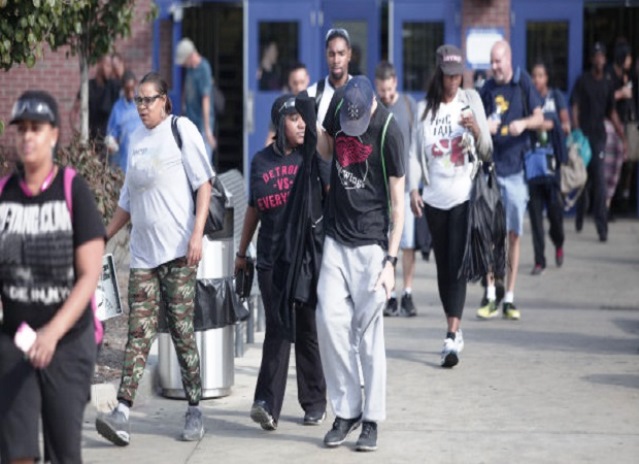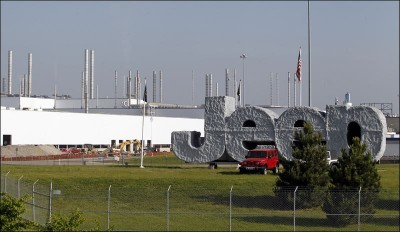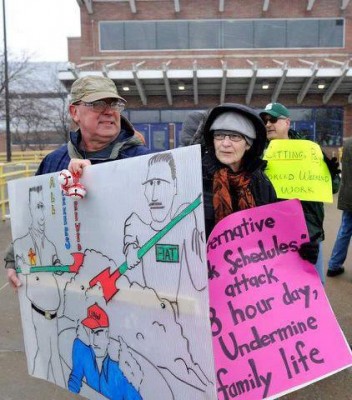By Dan DiMaggio
October 16, 2015
Auto workers at Chrysler will vote next week on a second contract proposal, after voting down the first agreement in a landslide in late September.
Auto workers at Chrysler will vote next week on a second contract proposal, after voting down the first agreement in a landslide in late September.
65 percent of UAW members at Chrysler voted no on the first deal, which they felt did not do enough to eliminate the two-tier system or protect jobs. This time around, the UAW International has hired PR firm BerlinRosen to sell the tentative agreement to members via social media. The UAW represents 40,000 workers at Chrysler.
Members, meanwhile, are engaged in a vigorous debate in the plants and on social media over whether the new contract is enough. A group of workers in the Jeep plant in Toledo are circulating a Vote No leaflet, and the Autoworker Caravan has a leaflet pointing out the contract’s lowlights, in contrast to the UAW leadership’s highlights document.
Labor Notes spoke to Alex Wassell, a member of UAW Local 869 and a longtime labor activist, about the new proposed deal. Wassell is a skilled tradesman who has worked at Chrysler’s Warren Stamping Plant for 22 years. Here’s what he had to say about why many workers remain opposed:
A lot of people are skeptical that it takes eight years or two contract cycles to get up to top-tier wages, although the pension and healthcare are still second-tier. People are disappointed that COLA [the cost-of-living adjustment, historically a part of UAW contracts but suspended in 2007] wasn’t part of the deal.
Alternative work schedules are still part of the contract. Even though they said in 60 days they’ll talk about it, I don’t believe anything substantive will come of it. The unlimited use of temporaries is another downside. For Mopar workers and Axle workers the deal’s probably worse than before.
So the new deal hasn’t changed my opinion, and there’s a lot of negative sentiment in the plant. I don’t think you need to hire a PR firm if you negotiate a good contract.
I just can’t trust them around the eight-year period to get to top-tier wages. That’s two contract cycles. They couldn’t even enforce the 25 percent limit on two-tier workers that they supposedly negotiated in 2011.
Under the 2011 contract, there was no cap. But there was language put in that at the end of the 2011 agreement, the 25 percent cap would be imposed and people would roll over and become first-tier. That didn’t happen because, guess what? At the end of the agreement everything’s up for discussion. People really think that cap should be honored.
End Two-Tier? An Interview
Chrysler worker Alex Wassell was interviewed on the Belabored podcast on October 15 about why auto workers are opposing the second tentative agreement. Listen to the interview here, between the 12- and 26-minute marks.
Wassell said that unlike the first round, workers at his plant will have to vote on this second proposal at the union hall, which is off-site. “I think that’s going to cut down the participation,” he said. “You can’t vote on your break time here, so you have to do it before, or after, or during your lunchtime—and lunchtime is iffy. So I see a diminished participation this time, although I think the sentiment is still running more against than for.”
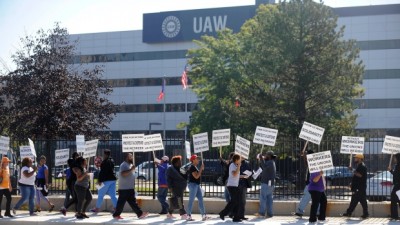
Protesters significantly chose to picket UAW Solidarity House in Detroit over the first contract which they voted down.
Chrysler workers will vote on the new agreement next Tuesday and Wednesday, October 20-21. Wassell predicts it will be close, but that a no vote will again prevail.
As far as what would convince him and other workers to vote yes, Wassell says: “I’d like to see the elimination of the tiered workforce within the four-year contract cycle. I’d like to see the restoration of the cost-of-living-allowance for all employees. I’d like to see second-tier (“in-progression”) employees get full medical and benefits to match the traditional workers. And I just need to feel that the International union and the secondary leadership is in tune with the rank-and-file and these demands.”
Auto workers: Let Labor Notes know what’s happening in your plant – contact dan@labornotes.org with any tips. And check out the rest of our site for more about our trainings and books.
Highlights of Past Labor Notes Auto Coverage
- Auto Workers Wonder, Why Chrysler?
- Can Auto Shed Its Tiers?
- New Eight-Hour Day Fight Erupts in Auto
- Canadian Auto Workers Ratify 10-Year Two-Tier
- Volkswagen in Tennessee: Productivity’s Price
- Generation Temp: Auto Workers March for Civil Rights Again
- UAW Says It Will Go ‘All In’ to Organize Foreign-Owned Auto Plants
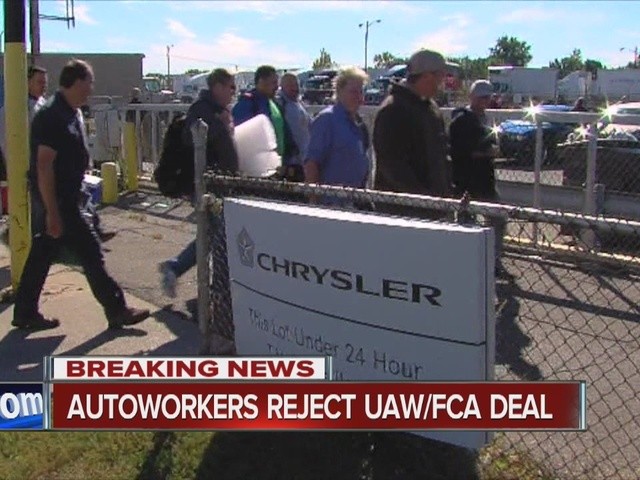 CHRYSLER WORKERS VOTE DOWN 2-TIER PACT
CHRYSLER WORKERS VOTE DOWN 2-TIER PACT
October 01, 2015
Auto workers have overwhelmingly voted down their union’s national deal with Chrysler, aiming to force their bargainers back to the table to do better.
The United Auto Workers announced today that 65 percent voted no on the tentative agreement. The union represents 40,000 workers at Chrysler.
Union officers had recommended a yes vote on the four-year pact, announced September 15. It included raises and bonuses but would maintain the two-tier system, trap people in Tier 2 who had expected to move up, and create even more tiers. Voting ended September 30.
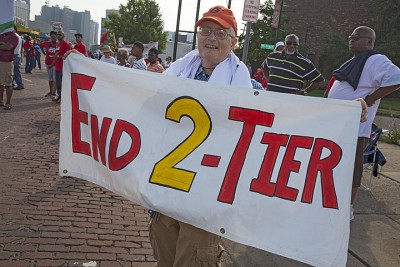
Detroit, Michigan – Members of the United Auto Workers participate in the Labor Day parade days before their union contracts with GM, Ford, and Fiat Chrysler expire. Retired Ford worker Ron Lare wants to end the two-tier pay system the union accepted in 2007.
Probably the top reason workers voted no was indignation that the agreement broke the union’s longstanding promise to cap the lower-paid tier at 25 percent of the workforce this fall. Since 45 percent of Chrysler workers are in Tier 2, many expected a raise to $28 an hour. With no cap, it’s only a matter of time before there’s no first tier left.
Amplifying the anger were Chrysler’s high profits and the revelation that the company plans to move car production to Mexico.
Facebook gave a big boost to the quickly-building momentum of the vote-no wave. In a variety of public and private Facebook groups, workers swapped contract information, local vote tallies, and photos showing ballots marked “no” and protest T-shirts.
The biggest, Local 12 (Toledo Assembly Complex, Ohio) with 5,000 members, was among the last to vote—and scored the most dramatic margin, with 87 percent of production workers and 80 percent of skilled trades workers rejecting the pact. Members there had rallied against the deal outside their informational meeting September 27.
Majorities also voted no in Locals 7 (Jefferson North Assembly, Detroit), 685 (four transmission plants in Indiana), 869 (Warren Stamping, Detroit area), 1248 (Mopar in Center Line, Michigan), 1264 (Sterling Stamping, Michigan), 1286 (Belvidere Assembly, Indiana), 1102 (Kokomo Casting, Indiana), 372 (Trenton Engine, Michigan), 1435 (Toledo Machining, Ohio), 1700 (Sterling Heights Assembly, Michigan), and others.
Just a few locals, mostly small, saw majorities vote yes.
‘BRIDGE TO NOWHERE’
“I feel like the people who hire in at the lower wage deserve the chance to get to where I’m at, to be able to live in a comfortable manner,” said Nancy Collins, a team leader at Kokomo Transmission in Indiana.
When she started at Chrysler 20 years ago, she was a single mom supporting three young kids. Today her daughter and son-in-law, with three kids of their own, work at the plant too.
But “how they make it on $19 an hour I’m not real sure, and that’s with both of them working,” she said. “They live paycheck to paycheck…. They do the same jobs we do. There’s no reason they should be paid so much less.”
In this year’s Big 3 bargaining, UAW officers had pledged to “bridge the gap” between the tiers. But the union’s choice to settle with Chrysler first—when General Motors and Ford are richer targets, with fewer second-tier workers—seemed aimed at lowering members’ expectations.
“It’s a bridge to nowhere,” said Alex Wassell, a welder repair worker at Warren Stamping near Detroit. “It looks like they’re not planning on closing that gap, just raising the lowest-tier workers up to this level and then waiting for traditional workers to quit, retire, or die.”
PROFITS SOAR
Non-union workers make up 81 percent of the U.S. auto workforce. Tiered contracts are worsening the union jobs that remain. “This job that built the middle class, now it’s going to build the poor working class,” said Asar Amen-Ra, a 20-year Mopar employee in Center Line, Michigan. Graphic: Sonia Singh.
The second tier, earning $15.78-$19.28 an hour, now comprises about 45 percent of the company’s workforce.
Meanwhile Tier 1 workers—those hired before 2007—have been frozen at $28 for years. CEO Sergio Marchionne has made no secret of his desire to phase out the top tier altogether.
The lower tier wasn’t supposed to balloon forever. “When we were hired, the company was just starting to turn around,” said Denny Crum, a forklift driver in Toledo who started two years ago.
“We were told by several people within the union, ‘These tiers are going away, we’re going to fight to get rid of them. These were just brought in to keep the company afloat when the economy crashed.’”
Meanwhile, the automakers have certainly bounced back, even Chrysler. The company’s latest figures, for the second quarter of this year, showed $1.4 billion in profit in North America, a robust profit margin of 7.7 percent. In the same quarter Ford pocketed 11.1 percent and GM 10 percent.
Marchionne himself took home a handsome $72 million last year. Assuming a 40-hour week, that comes to $34,615 an hour.
“That’s why we’re all wondering,” Collins said. “They say they don’t have any more money to offer us. I don’t see how that can be.”
BROKEN PROMISE
Many members are especially angry that the union and Chrysler abandoned a longstanding promise to move a segment of Tier 2 workers up into Tier 1. The 2009 settlement agreement and 2011 contract summary reiterated that the lower tier would be capped at no more than 25 percent of the workforce as soon as the contract expired in September 2015.
That means nearly half of Chrysler’s second-tier workers were supposed to move up to $28 this month. They had waited years for this raise.
Instead, under the proposed deal they would be stuck in Tier 2 for good, earning $17-$24 at first, and eventually topping out at $25.35. Workers say union officers’ excuse is that the promise was only in the contract summary prepared by the union, not in the actual contract.
“Doing the same work, side by side with somebody that makes $10 more, is not okay with me,” said Alex Smith, who works for Mopar, Chrysler’s parts distribution unit, in Los Angeles.
In his plant, one worker printed up T-shirts reading “Solidarity, No More Tiers, Vote No!” Many wore them to work the day before their vote.
Managers “said it was going to pass anyway and we were wasting our time,” Smith said. But the next day, Local 230 became one of the first to vote the settlement down.
Even if the 25 percent cap had been honored, “that still leaves a quarter of our workforce being treated as second-class citizens,” Crum said. “I don’t think there should be a Tier 2 at all. There has to be a path for everyone to eventually make the same.”
HIDDEN LOWLIGHTS
Another in the first wave of no votes was Local 1248, which represents Mopar’s headquarters facility in Center Line.
Months ago, members there formed a committee that’s been studying union history and current labor battles, and spreading the word with “old-fashioned, one-on-one organizing,” said Amen-Ra: “each one teach one.”
Adding insult to injury, someone discovered a provision—buried on page 255 of the 456-page tentative agreement—that would create new subdivisions within Tier 2, with axle workers topping out at $22.35 and Mopar workers at just $22.
The union’s breezy official “contract summary” hadn’t mentioned the lower wage scale for Mopar. But members made copies of that page, posting them up in the cafeteria and handing them out at the plant gates.
“Basically we were being deceived,” Amen-Ra said. “People were very upset about that.”
Another buried provision (pages 265-270) would create a still-lower tier of temporary workers. The old contract allows temporary part-timers to replace absent workers only on Mondays, Fridays, weekends, and holidays.
Now temporary workers could be full-time, work any day of the week, and be used in a range of situations besides absences. Current temps would be grandparented into a wage scale of $17-$22. Newly hired temps—an even lower tier—would make just $15.78-$19.28.
Meanwhile Tier 1 workers, who’ve gone a decade without a raise, would only get 3 percent raises in the first and third years of the four-year contract, and 4 percent lump sums the other years. The deal wouldn’t restore inflation-based cost-of-living raises for them, or for retirees on pensions.
Workers in both tiers “feel betrayed,” said Bill Parker, former president of Local 1700 at Sterling Heights Assembly. “They were supposed to be trying to eliminate the division between us. This thing makes the division worse, it makes it permanent, and it creates new divisions.”
‘MADE IT WORSE’
Second-tier workers from Detroit’s huge Jefferson North Assembly Plant led an impromptu vote-no rally September 23 outside the union’s international headquarters. Photo: Judy Wraight.
About 30 people, mostly second-tier workers from Detroit’s huge Jefferson North Assembly Plant, held an impromptu vote-no rally September 23 outside the union’s international headquarters.
Besides the tiers, members were angry that the deal would worsen an already draconian attendance policy. “That was one of our major complaints, to fix it—and they made it worse somehow,” said Blake Williams, a five-year employee who drives a forklift.
Employees say the company doesn’t excuse absences or tardies for things outside their control—traffic accidents, construction, weather, a sick child. You have to have a doctor’s note, and even then it’s hit or miss.
For instance, Chrysler wouldn’t accept Williams’ excuse note from the emergency room when he took his twin babies, both running high fevers, to the hospital.
Under the old contract, seven occurrences in a year would get you fired. The tentative agreement would separate tardies from absences, but just three in a year would be punished with a one-day layoff; the fourth tardy, a five-day layoff; the fifth tardy, a 30-day layoff; the sixth tardy, firing.
Workers took it into their own hands to pass the word about the deal’s lowlights. Williams and a few co-workers read the whole contract and spread the details as quickly and widely as they could.
Their idea wasn’t to push a no vote, just to “tell everything you know, good or bad, so everybody can make an informed decision.” Local 7’s production workers rejected the deal with 66 percent voting no, and skilled trades with 77 percent.
Pamela Pate works on the door line. She’s put in 16 years on Chrysler’s assembly lines in three different plants, and moved twice for the company.
On top of the other problems with the deal, she was frustrated it wouldn’t restore the seniority she and others lost when their previous plant closed. She came to Jefferson North in 2011, making her less senior than the influx of 2010 hires.
“I’ve got a decent job for now. I’m 44 and I still feel like I’m young and I’m able to do it,” she said, “but I’ve got another 13 years to go before I retire.” She had hoped one day to bid into a less physically grueling job in the body shop or paint shop. Now that looks impossible.
FEW ANSWERS
The agreement’s sweeteners are a $3,000 signing bonus for everyone and a profit-sharing formula that’s somewhat more generous for the second tier. But it’s unlikely the profit-sharing payouts would turn out as high as the appealing sums mentioned in the contract summary, Williams pointed out—since those depend on the company hitting “almost unattainable” financial targets.
The deal would do little to alleviate the unpopular Alternative Work Schedule, which has forced members at affected plants onto four-day weeks of 10-hour shifts. Two-thirds work every Saturday, and one-third flip between day and evening shifts every week. Those who regularly work Saturdays would now get time-and-a-quarter pay, but no relief from the grueling schedule.
The language on health care is vague. Chrysler and the union agreed to create a co-op with Ford and GM to pool employees’ health care expenses, with details to be worked out later, and to weaken benefits if necessary to avoid the Affordable Care Act’s looming Cadillac tax.
“Why would I vote for something that I have no details on?” Amen-Ra asked.
Collins sat through a four-hour informational meeting in hopes of getting some answers, but left unsatisfied. UAW Vice President Norwood Jewell “kept saying we’ve only been out of bankruptcy for six years,” she said. “I sat there thinking, ‘But look at the money that Chrysler has made in six years.’
“I got the feeling at times that he [Jewell] was annoyed that we were smart enough to ask some of the questions we were asking. He would just talk in circles.”
Revealed at the same time as the contract settlement was a plan to move products around so that all Chrysler’s small cars will be made in Mexico and its trucks and SUVs in the U.S.
For now, the larger vehicles are more profitable. “But the risk for the union membership is, what happens if gas prices skyrocket?” Parker said. “What happens if environmental issues force a reduction in trucks and SUVs, then where are we going to be?”
‘A BIGGER PIE’
After the first wave of no votes, Parker predicted that union officers would ramp up the pressure on workers in the remaining locals to vote yes.
“I’m quite sure they’ll spend Monday telling my plant that the 200 [a midsize car currently made in Sterling Heights] going to Mexico is a done deal, but whether the truck stays here, that depends how you vote on the contract,” he said days before Local 1700’s vote.
“The other argument they’re trying to come up with now is, ‘If you vote it down, all we’re going to do is go back to the bargaining table and re-divide the pie.’”
Instead, he argued, “they need to negotiate a bigger pie.” His local stood up to the heat: 72 percent voted no in production and 65 percent in skilled trades.
What now? One possible outcome is for the union to put the Chrysler deal on hold while it bargains with Ford and General Motors.
When Ford workers voted down their contract in 2009, it stuck. When Chrysler’s skilled trades workers voted down theirs in 2011, then-UAW President Bob King declared it ratified anyway by lumping together skilled trades and production.
The union’s Chrysler council, made up of elected leaders from each local, is meeting today in Detroit to regroup.
Meanwhile the union has announced that Ford workers may go on strike October 4 at the Kansas City Assembly Plant (Local 249, Missouri), which makes the bestselling F-150 pickup truck.
Ford has responded by cancelling production shifts for October 2-4 at the Kansas City plant, and scheduling maximum mandatory overtime at its Dearborn Truck Plant. A letter distributed to employees in Dearborn said the union’s Ford Department had advised the local that the company had a contractual right to do this.
The strike would be over local bargaining, which is happening simultaneously with national. The sticking points are extreme heat in the plant (which isn’t air-conditioned), skilled trades scheduling, and “manpower provisions.”
At Chrysler, today workers passed around on Facebook a newly posted bulletin from management at Jefferson North, announcing a policy of “zero tolerance for poor quality.”
“Our next move is to make sure the leadership knows we are not stopping,” Amen-Ra said even before the final votes were in. “We are going to continue to organize and make sure they go back to the table and get a better contract.”
Alexandra Bradbury is editor of Labor Notes.al@labornotes.org
– See more at: http://labornotes.org/2015/09/so-far-chrysler-workers-roundly-rejecting-two-tier-pact#sthash.TQUtMDTi.dpuf

